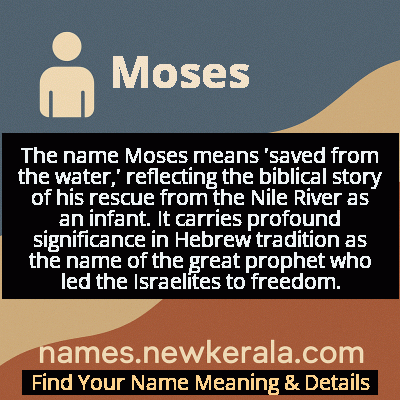Moses Name Meaning & Details
Origin, Popularity, Numerology Analysis & Name Meaning of Moses
Discover the origin, meaning, and cultural significance of the name MOSES. Delve into its historical roots and explore the lasting impact it has had on communities and traditions.
Name
Moses
Gender
Male
Origin
Hebrew
Lucky Number
8
Meaning of the Name - Moses
The name Moses means 'saved from the water,' reflecting the biblical story of his rescue from the Nile River as an infant. It carries profound significance in Hebrew tradition as the name of the great prophet who led the Israelites to freedom.
Moses - Complete Numerology Analysis
Your Numerology Number
Based on Pythagorean Numerology System
Ruling Planet
Saturn
Positive Nature
Ambitious, efficient, realistic, and authoritative.
Negative Traits
Materialistic, stressed, confrontational, and can be overly ambitious.
Lucky Colours
Dark blue, black.
Lucky Days
Saturday.
Lucky Stones
Blue sapphire, amethyst.
Harmony Numbers
2, 4, 6.
Best Suited Professions
Business leaders, managers, financial services, law enforcement.
What People Like About You
Leadership, determination, organizational skills.
Famous People Named Moses
Moses (Biblical)
Prophet and Leader
Led the Israelites out of Egyptian slavery and received the Ten Commandments
Moses Maimonides
Rabbi and Philosopher
Authored the Mishneh Torah and Guide for the Perplexed, foundational works in Jewish law and philosophy
Moses Malone
Basketball Player
NBA Hall of Famer, three-time MVP, and one of the greatest centers in basketball history
Name Variations & International Equivalents
Click on blue names to explore their detailed meanings. Gray names with will be available soon.
Cultural & Historical Significance
In Christian tradition, Moses is viewed as a precursor to Jesus Christ and a central figure in salvation history. He appears prominently in the New Testament and is celebrated for his role in God's plan of redemption. Islamic tradition honors Moses (Musa) as one of the greatest prophets who received divine revelation and guidance. Across these religious contexts, the name embodies themes of leadership, divine communication, moral law, and the struggle for justice that continue to resonate in modern cultural consciousness.
Extended Personality Analysis
People named Moses are often associated with strong leadership qualities, moral integrity, and a sense of divine purpose. They tend to be natural guides and protectors, exhibiting patience and wisdom in dealing with complex situations. The historical Moses's characteristics of perseverance through forty years in the wilderness often translate to modern expectations of resilience and long-term vision. These individuals are frequently seen as mediators who can bridge different perspectives and bring people together toward common goals.
There's also an expectation of spiritual depth and ethical conviction associated with the name. Moses-named individuals are often perceived as having a strong sense of justice and the courage to confront injustice, even when it requires personal sacrifice. They typically combine practical leadership skills with philosophical or spiritual insight, making them effective in roles that require both management and inspiration. The name suggests someone who can navigate challenging transitions and lead others through periods of significant change while maintaining core principles and values.
Modern Usage & Popularity
Moses continues to be used as a given name primarily within religious communities and among families valuing biblical heritage. While it ranks outside the top 100 names in most English-speaking countries, it maintains consistent usage and has experienced a modest resurgence as classic names regain popularity. In Israel, the Hebrew form 'Moshe' remains one of the most common male names. The name is particularly favored by Jewish families, evangelical Christians, and those appreciating its historical significance. Modern usage often reflects a desire to honor religious tradition while bestowing a name with strong, positive associations of leadership and moral strength. The name's timeless quality and cross-cultural recognition contribute to its enduring appeal across generations.
Symbolic & Spiritual Meanings
Symbolically, Moses represents the archetype of the liberator and lawgiver, embodying the transition from oppression to freedom and from chaos to order. The name carries deep metaphorical significance as a bridge between the divine and human realms, representing revelation, covenant, and moral guidance. The 'saved from water' origin story adds layers of meaning related to destiny, protection, and miraculous survival. Moses symbolizes the journey through wilderness and challenge toward promised fulfillment, making the name representative of perseverance, faith, and transformational leadership. In psychological terms, it embodies the human capacity to receive and transmit higher wisdom while navigating the complexities of community and morality.

